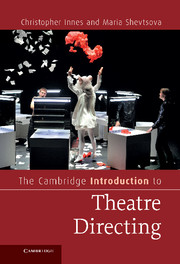Book contents
- Frontmatter
- Contents
- List of illustrations
- Acknowledgements
- Introduction
- Chapter 1 Traditional staging and the evolution of the director
- Chapter 2 The rise of the modern director
- Chapter 3 Directors of theatricality
- Chapter 4 Epic theatre directors
- Chapter 5 Total theatre: the director as auteur
- Chapter 6 Directors of ensemble theatre
- Chapter 7 Directors, collaboration and improvisation
- Notes
- Select bibliography
- Index
- References
Chapter 2 - The rise of the modern director
Published online by Cambridge University Press: 05 April 2013
- Frontmatter
- Contents
- List of illustrations
- Acknowledgements
- Introduction
- Chapter 1 Traditional staging and the evolution of the director
- Chapter 2 The rise of the modern director
- Chapter 3 Directors of theatricality
- Chapter 4 Epic theatre directors
- Chapter 5 Total theatre: the director as auteur
- Chapter 6 Directors of ensemble theatre
- Chapter 7 Directors, collaboration and improvisation
- Notes
- Select bibliography
- Index
- References
Summary
Towards the end of the nineteenth century, theatrical conditions fostered the emergence of the modern director. Already foreshadowed by the Intendant system, established in Germany almost exactly a hundred years earlier, the earliest came out of that system: Georg II, Duke of Saxe-Meiningen (1826–1914). He was followed by a group of near contemporaries: André Antoine (1858–1943), working with Zola (1840–1902), Konstantin Stanislavsky (1863–1938), Adolphe Appia (1862–1928) and Gordon Craig (1872–1966). The first who qualify as modern directors, they created and represent the major lines of stylistic development at the beginning of the twentieth century. Each contributes different elements; but as we shall see, all share certain standards in dealing with dramatic material as well as common approaches to staging, and each combines theatre practice and theory: either developing theory from the work, or basing work on theory. Two – Antoine and Stanislavsky – continued to act major parts in the plays they directed, while Craig gave up an acting career specifically to reform the stage. One other influence needs to be noted: as a composer, Richard Wagner (1813–1883) conducted his own operas, and, in adding the function of commissioning settings and costumes as well as orchestrating the singers’ moves, offered a model of the theatrical auteur that was to be picked up by Appia and Craig, working on principles of design.
The Meiningen Players and the conditions for naturalism
As the owner of his own court theatre, and taking over the position of Intendant himself, the Duke of Saxe-Meiningen had complete freedom to experiment. In contrast to the English-speaking theatre’s focus on stars, in the form of the actor-manager, the Intendant system encouraged ensemble acting. And unity of expression on the stage, as well as ensemble work, was epitomized by his Meiningen Players.
- Type
- Chapter
- Information
- The Cambridge Introduction to Theatre Directing , pp. 36 - 76Publisher: Cambridge University PressPrint publication year: 2013



